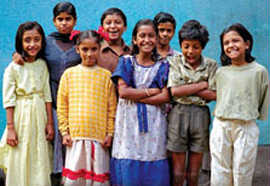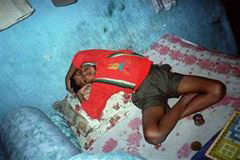

One of the features nominated for this year's Academy Award for Best Documentary is Born Into Brothels, Zana Briski's searing look at the children of prostitutes in Calcutta's red light district. In a strategy marginally similar to Voices of Iraq, Briski and co-director Ross Kaufman gave these children cameras and asked them to document their lives. The concept came about as Briski was in Calcutta working on projects about the red light district. As she spent more time in the brothels, she noticed the large number of children running around. Strangely enough, aside from their wretched living conditions and bleak future, these children acted and played like ordinary kids. They are so cute and full of life, that it hurts to think about where they may be headed.
This broke Briski's heart. Even the children could see that they had no future. Suchitra seemed destined to work "the line." Other children slaved away during the day. Briski gave them cameras and photography lessons, and the results were surprising. These children, with their photographs, were able to give the world a glimpse into their lives. At the same time, Briski became very attached to them and made it her mission to save each one. She ran into a huge obstacle; many of the private or parochial schools that could give these children a chance at living a 'normal' life would not accept them because of who they were. Born Into Brothels spotlights each child and some of his/her photographs, set against the larger backdrop of Briski trying to rescue them. Briski is very simple and straightforward in how she conveys her messages. There is no need to pad thing to make them look more desperate. She simply introduces each child, gives some background on their family situation, and shows some of their photographs. It is very effective.
Some of their photographs are pretty good. Briski thinks so, and is able to arrange two shows, one in New York and one in Amsterdam spotlighting the photographs. These shows also provide a worldwide audience for the plight of these and other children in India, which is exactly what Briski wants to happen. The film becomes a sort of crusade, as Briski involves herself more into the lives of the children, even when some, like Avigit, don't seem to care much anymore. This is a good piece of advocacy filmmaking, where it doesn't matter that Briski has no sense of objectivity. She passionately wants a better life for these children (who call her "Zana Auntie"), and works as hard as she can to secure this.